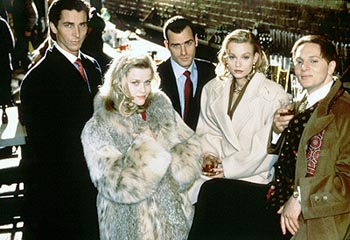![[MetroActive Movies]](/movies/gifs/movies468.gif)
[ Movies Index | Show Times | Santa Cruz Week | MetroActive Central | Archives ]
The '80s Live: From left to right, Christian Bale, Reese Withersoon, Justin Therous, Samantha Mathis and Matt Ross look back at a bygone decade in 'American Psycho.'
A Feminist 'Psycho'?
Director Mary Harron finds easy targets in shallow satire of Bret Easton Ellis' 'American Psycho'
By Richard von Busack
MANHATTAN MERGERS and acquisitions banker Patrick Bateman (Christian Bale) is attractive, wealthy and physically perfect. As the title character in American Psycho, he's also a madman who likes to kill by hideous and bloody means, including chain-saw, nail gun and chrome-plated ax.
The death of his acquaintance Paul Allen (the extraterrestrially named Jared Leto) causes a private detective (Willem Dafoe) to investigate the banker. But Patrick's co-workers, his fiancée (Reese Witherspoon) and his mistress (Samantha Mathis) are blind to his dementia. His nerve begins to fail him, and he loses the ability to tell reality from fantasy.
Of course, it would have been a real surprise if the film of American Psycho had been worse than the novel. Surprise, hell--it would have been impossible. Much of the film delivers a modest pleasure, if you can stand sex and violence--and apparently most viewers can.
The good points are little touches by the actresses: Witherspoon screwing up her face into the imitation of a pot-bellied pig; Cara Seymour expertly underplaying the pathos of a street whore; and Chloë Sevigny, lovely as a Florentine Madonna, transcending her role as the Surviving Virgin.
American Psycho also offers a satisfying glimpse of co-scriptwriter Guinevere Turner (of Go Fish) as a drunk, exIvy league floozy. Turner brings charm to one of the caricatured Lost Women who populate author Bret Easton Ellis' unreadable fictions.
Ellis' Bateman (the name is some kind of nod to poor Norman Bates) is an animatronic version of a yuppie. He's based on Ted Bundy and a bit on Santa Cruz's Ed Kemper (misidentified by Ellis as Ed Gein; no real serial-killer aficionado would make this mistake). Bale's Bateman, by contrast, is back-handedly likable despite his misdeeds; he's too much of a wonk to be a real threat, an affluent reject with a fantastic body, amply shown off by director/co-writer Mary Harron.
In Ellis' pin-headed novel, Bateman was both caricature of evil yuppie and a yuppie avenger. Counter-culture types could laugh at Bateman's brand-name fetishism. (Some of the cruelest torture in the book was the way Ellis racked this joke.) And yet Bateman cleansed the streets of the homeless, the hookers and the foreigners who made life uncomfortable for the good WASP.
AS IN ALL HEDGED SATIRE, different kinds of people could read American Psycho--if their stomachs didn't revolt--and feel that Ellis was on their side. Harron makes it clear which side she's on. She mocks the androidish Bateman and drastically cuts back on his pornographically described violence. That tactic makes the movie more humane than the book, anyway.
Compare Ellis' novel to Martin Amis' scathing novel about the same milieu, Money, and it's easy to see the difference between a twerp and a master. Compare American Psycho to Jim Thompson's novel The Killer Inside Me, and one can understand the difference between an author who is repeating what he's heard--indifferently, carelessly--and an author who has really pored over the soul of a sociopath.
If American Psycho had come along at the end of the '80s, turning up unannounced at one of the sticky-floored grind houses that still existed in the dawning of the VCR era, it might have looked like a brave work of satire, a smart underground film. Maybe American Psycho would have resembled 1989's Vampire's Kiss, also about a deranged yuppie (Nicolas Cage), who's convinced he's a vampire and whose bad behavior isn't noticed because of the corporate bad manners around him. Vampire's Kiss has the authentic atmosphere of a cruel era.
American Psycho tries to be an '80s movie, with quotes around it, and this makes it quaint. The jokes about '80s music get the best laughs, since the soulless Batemen likes to orate in rock-crit speak about the depth of the emptiest, blandest pop hits of Huey Lewis and Phil Collins. These bad-music jokes are hilarious, but they're funny in a tame, obvious way.
Making a feminist film out of Ellis' hateful book is a feat, like making a silk purse out of a sow's ear. It might better to start with silk in the first place. American Psycho is feminist only at the level that it suggests that men can be vicious and selfish; it's cutting, only in the way it suggests that too many possessions can make a man cold-souled (which is the message of a radical societal critique like The Thomas Crown Affair).
The only way to give American Psycho teeth would be to set it in the present. We can mock the fashions and the music of the '80s, but has corporate culture changed all that much in the past 13 years? If you enjoy morbid humor, you can have a good time at American Psycho, but don't be fooled by its pretensions of depth. The film is no threat; its nostalgia gives it a clubby, inside humor like a mildly amusing cartoon in The New Yorker.
Copyright © Metro Publishing Inc. Maintained by Boulevards New Media.
![]()

Photograph by Kerry Hayes
American Psycho (R; 97 min.), directed by Mary Harron, written by Guinevere Turner and Harron, photographed by Andrzej Sekula and starring Christina Bale, Willem Dafoe and Jared Leto, plays at selected theaters.
From the April 19-26, 2000 issue of Metro Santa Cruz.